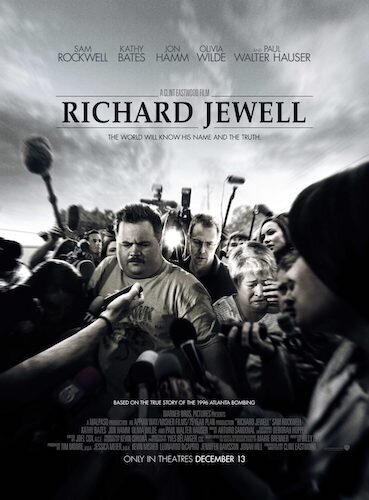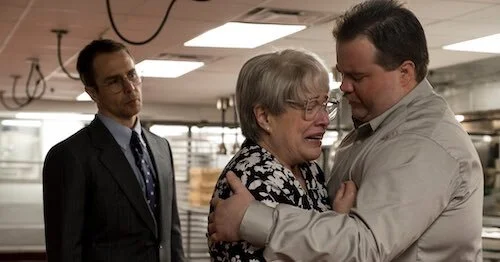Richard Jewell
So, I hear Richard Jewell has become the (possible) lowest grossing film of any Clint Eastwood directed features to date. That’s far too bad. Despite being only pretty good, I would argue it’s one of Eastwood’s stronger efforts this decade (far better than the top-grossing Eastwood film American Sniper, by miles). Maybe people are used to the 2010’s Eastwood formula by now. We have a standard film, that’s very safe-Hollywood in tone, with notable faces and a current message. This time, we have a battle against fake news, with the retelling of the story of Richard Jewell: a security guard that helped save lives during the pipe bombing of Centennial Park at the 1996 Atlanta Olympic Games. The slant on how the media and FBI botched Richard Jewell’s life for a number of years is ever so present.
Despite a decently meaty core section (when Jewell confides in his attorney Watson Bryant, and how we see mother Bobi Jewell reacting to this mess), Richard Jewell is bogged down by a few sloppy decisions. We barely get a reason why FBI agent Shaw and his men are so hell bent on going after Jewell, outside of him being a guy that can be easily profiled. We know Shaw is wanting to find out who planted the bomb, especially since Shaw himself was at the park and was hurt. However, just tagging a guy, while likely accurate in real life, just feels rushed in a film that focuses so much on how Shaw wants to send Jewell into the slammer. Maybe a bit more time of Shaw reanalyzing the scene would have benefitted. Also, reducing Kathy Scruggs to the role of a villainous, witchy reporter that will sleep for the scoop (spoiler alert: she never did any such thing in real life), only for her to flip within microseconds is unbelievably lazy. I know the “bad guys” in this story are unforgivable. That I can agree with. Making up stuff, or using “just because” as a reason just doesn’t work.
The Jewells and attorney Bryant.
Also, we have to deal once more with Clint Eastwood not being entirely sure as to how he should wrap up a biopic (although Richard Jewell ends a thousand times better than American Sniper or Sully). We leap through the latter years of Jewell’s life in a conceptually clever way (we see how he is now, what’s going on in his life), but the scenes themselves feel a bit lacking and rushed. Otherwise, this is at least a better attempt than Eastwood may be known for these last ten years. But enough about slagging on the film! I gave this a 3.5/5. What does work?
Well, that’s easy. The leading three cast members (the ones not resorted to being Disney villains) are solid. I’m starting off with my boy Paul Walter Hauser, because I’ll be damned if I see him as the lowest billing on a poster for a film he is the star of. Being used to his usual buffoonery (I, Tonya, BlackKklansman, even It’s Always Sunny in Philadelphia), it’s wonderful to see him take on a role where he is the centre of attention and can display his acting chops (plus, he subverts the “idiot” stereotype he even is given in this film). Kathy Bates turns in a possible Oscar-nominated performance as mama Jewell, whose eyes clip from side to side, wondering how this all happened; her cries can also resemble screams for help, to help her and her wrongfully accused son. Sam Rockwell is dependable as per usual, this time as attorney Bryant, who adds a lot of legal focus to the narrative.
If there’s one thing the story did quite well, it was establishing Jewell’s faith in authority, and seeing that admiration slowly get crushed by a system that is failing him. The fake news angle is one thing. Eastwood showcases how he appreciates law enforcement, but hates the people that give these figures a bad name (like a Shaw, for instance). Despite how cartoonish the antagonists here can be, the rest of the film delivers this message much more sanely. Jewell always wanted to be treated seriously by becoming a proper officer, but now he doesn’t know so much. Why be the monster that can ruin lives out of stupidity? One good aspect of the ending is how Eastwood provides the answer: you can be both an authoritative figure, and a good person.
Andreas Babiolakis has a Masters degree in Film and Photography Preservation and Collections Management from Ryerson University, as well as a Bachelors degree in Cinema Studies from York University. His favourite times of year are the Criterion Collection flash sales and the annual Toronto International Film Festival.





